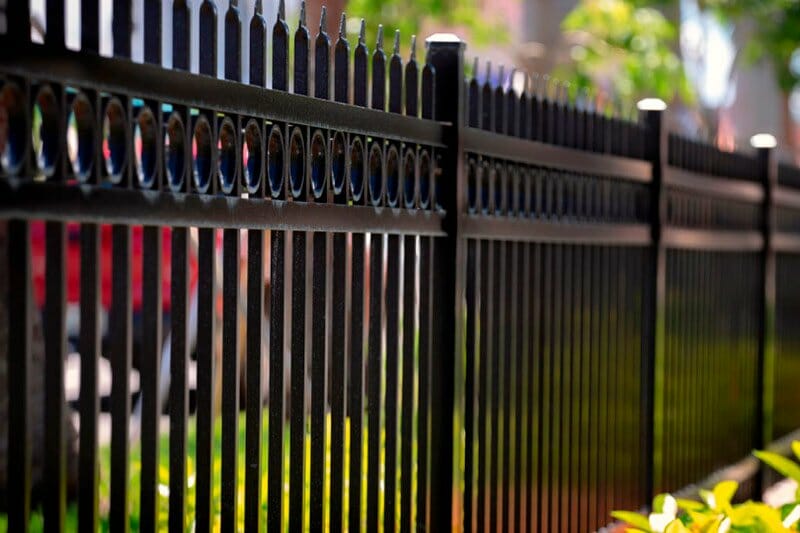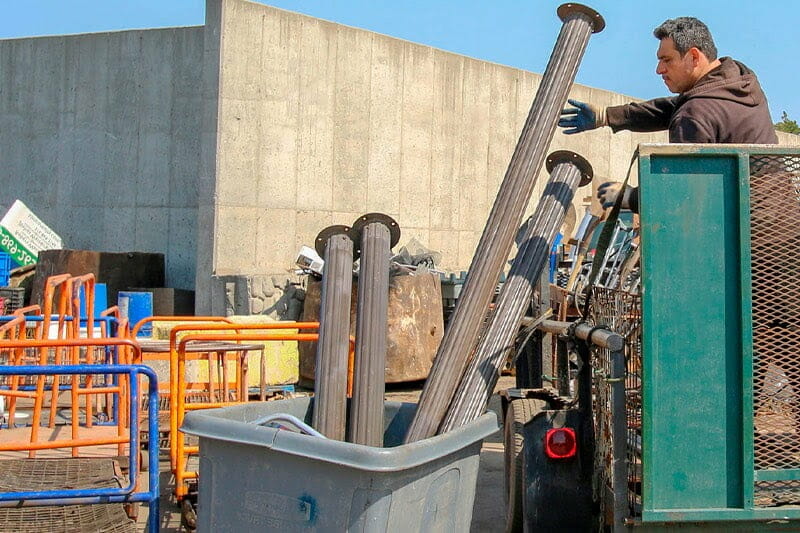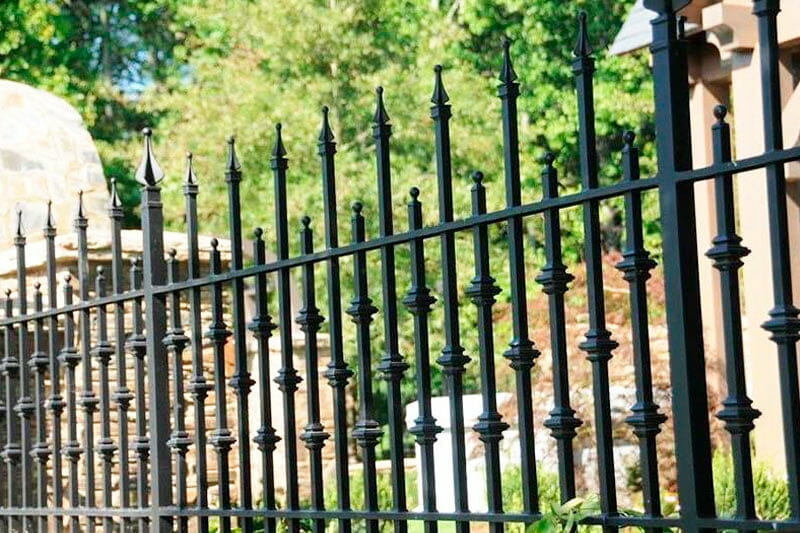Choosing the right fence, much like other essential parts of a home, can significantly improve its attractiveness and charm.
Aluminum and wrought iron fences are ideal for securing your property and adding an elegant touch to a property. Aluminum and wrought iron fences are good options when you’re not looking for compact fencing options. Whether to use an aluminum fence or a wrought iron fence is influenced by personal preferences and the key aspects of the different materials.
Each fencing option’s features, advantages, and disadvantages will help you make an informed decision based on your needs and preferences.

Aluminum Fences
Aluminum is an elegant yet affordable fencing option suitable for multiple scenarios and varying terrains. It is popular for its ability to last years without rusting and can be used on commercial and residential properties.
There’s a lot to love about aluminum fences, making them a superior option. Here are the top reasons to love aluminum fencing.
Versatility
The versatility of aluminum fences makes them adjustable in line with the nature of the land. Thus, aluminum fencing can be used regardless of whether the land is flat or sloppy.
With aluminum, you get to choose from four grades of aluminum fence panels, including residential and industrial grades that vary in stability. You can also choose from various colors, including brown, beige, grey, white, and black powder coating.
Aluminum posts are lightweight and flexible enough to be molded into various decorative designs. The versatility of aluminum fences extends to the ability to customize the height of the fence by the local code and to top up with spikes for vamped-up security.
Affordability
Despite having a similar regal appearance to steel and wrought iron fencing, aluminum fences are cheaper. The affordable price point can be attributed to manufacturers spending because it is easy and light to work with.
Should you decide to have your aluminum fence installed by professionals, you won’t have to break the bank. That’s because a linear foot of aluminum fencing costs between $8 – $30, while it costs between $12 and $125 to install.
Comparably, wrought iron costs $24 – $27 per linear foot, and the installation costs can go as high as $1600, depending on the customization of the design.
Its lightweight nature makes installing easy, ensuring you can save on installation costs by doing it yourself. In addition, aluminum fencing is a long-term investment that does not require frequent maintenance, making it even cheaper in the long run.
Low Maintenance
Aluminum fencing is virtually maintenance-free. You don’t need to paint or refinish your aluminum fence after it’s installed, as you would with vinyl or wood fences. That’s because it’s powder-coated for the long haul and won’t chip or peel. It won’t rot like wood or rust like a wrought iron fence, steel, or iron fence.
Aluminum does not contain any iron. Thus, it’s not susceptible to oxidizing, rust, or corrosion, even in damp conditions. As a result, an aluminum fence is adaptable and lasts long in various environments.
Most homeowners love and vouch for aluminum fencing because you can maintain its look with little to no effort. The most you need to do is hose it down once a month or so to get rid of any lingering dust and debris.
Environmentally Friendly
Aluminum is among the very few fencing materials that are recyclable. More precisely, you can find aluminum fences produced from recycled aluminum without losing their quality and strength.
After years of use, your aluminum fence can be recycled again, reducing landfill waste. Moreover, because this fence material requires negligible maintenance, you won’t be contributing to ozone gas production by painting and staining your aluminum fence every so often.
You also contribute to less carbon emission because producing recycled aluminum requires significantly less energy.
Like everything else, aluminum has some less desirable qualities that could make wrought iron fencing a better fencing material in 2021. Here are some of the disadvantages of aluminum fences.

Not Ideal For Privacy and Security Purposes
Aluminum fences consist of thin and closely arranged bars that do not offer much privacy when used as a barrier. They do not conceal a property entirely compared to wrought iron, vinyl, and wood fencing. Aluminum fencing does not prevent neighbors from seeing a home. If privacy concerns you, you can plant some shrubs along the fence.
An aluminum fence will keep intruders from your property and confine children and pets within your yard. You can use an aluminum fence as secure pool fencing, but it won’t be effective in protecting against large animals or vehicles veering off a busy road.
Aluminum fences are also less secure than fences that are screwed together. This makes it easy for intruders to locate junctions, unscrew them, and make their way into the property. You can enhance security by asking your installer to make the screws face inwards.
It Is Lightweight
An aluminum fence is light and less durable as compared to a wrought iron fence. Therefore, it is not ideal for use in areas susceptible to strong winds as it can easily get damaged.
Unlike wrought iron, an aluminum fence cannot withstand the heavyweight of falling trees or crushing my large animals. As a result, the fence will end up damaged and need some repairs to become functional.
Takes Long To Install
The installation of an aluminum fence would ideally take 3-4 days. The period is longer as compared to the installation of other types of fencing. It typically takes 2-3 weeks to receive your aluminum fence materials once you place an order. Additionally, the concrete and bracketing of the aluminum fencing would take 3- 4 days, making it a long period for making the fence.
Wrought Iron Fencing
Wrought iron is a strong material that is used in the creation of durable fences. It is a sturdy material consisting of a combination of iron ore and iron silicate. Wrought iron is highly malleable, making it easy to customize into various decorative designs per the client’s specifications.
There are many benefits to selecting a wrought Iron fence over an aluminum fence.

Durability
Wrought iron is used in the construction of strong and durable fences. The combination of steel and iron in making the fences and the proper coating make the fence durable.
The wrought iron fence is fondly described as the “100-year fencing” due to its durability. It can literally outlive you.
During its lifetime, a wrought iron fence can withstand many harsh conditions, such as strong winds, falling trees, and resist penetration and damage by fire and water.
A wrought iron fence is much stronger and lasts longer than other fencing materials, which justifies its high price point compared to the cost of the other fence options.
Security
Wrought iron fencing is firmly secured on the ground, making it impossible for someone to bring it down. The strong material used for its construction makes it difficult to break or even cut through it.
Its strength makes it virtually indestructible and unlikely to fall prey to simple destruction like a vinyl fence or an aluminum fence. A wrought iron fence features an upright picket and rail construction that makes climbing difficult for intruders, unlike wood and chain link fencing options that provide hand and footholds to aid climbing.
It is secure for kids and pets as it would offer the ultimate barrier to their movement out of a premise. It can be used in securing a garden by ensuring pets and other animals cannot easily access the given premises.
You can enhance the fence with additional spikes to prevent intruders from accessing your property by climbing over the fence. Wrought iron fencing can also be used as an enclosure over swimming pools.
Designs
A wrought iron fence has a classic look that gives unparalleled aesthetics when compared to aluminum fencing.
The alloy used for its production is elastic and malleable, making it possible for designers to shape it into limitless patterns, shapes, and styles.
Its malleable nature makes it easy to customize the designs of the fence to match a home’s design and curb appeal. Besides, it can be customized further to complement the classic, modern, victorian, and other home themes.
Added Value
Wrought iron fencing adds to the perceived value of a property. Typically, a home’s curb appeal determines its perceived worth.
The classic look of wrought iron fencing adds an air of elegance and sophistication, improving the aesthetic appeal of a home or commercial building and its street value compared to other properties in the region.
A wrought iron fence is an investment that will stand the test of time and trends. It won’t lose value no matter what’s hot and what’s not.
Just like aluminum fencing above, wrought iron fencing has several disadvantages that could discredit its use.
Expensive
Wrought iron fencing is costly as compared to aluminum fencing. Wrought iron’s high price point is caused by the difficulty of producing it due to its dense and heavy-duty nature.
The versatility in wrought iron fence designs also comes at a price, and you should expect to pay more for highly customized designs.
The initial cost of purchasing the materials and the cost of the installation of the customized fence is very high.
Susceptible to Rust and Damage
Regular maintenance can help prevent rust and protect your wrought iron fence from wear and tear caused by extreme weather conditions. But, unfortunately, there is no foolproof way to protect the fence from these elements.
When exposed to harsh weather conditions for long enough, it begins to form rust spots due to slag, which is a byproduct of iron ore used in the production of the metal fence. Slag provides wrought iron with its elegant look and feel but forms tiny pits that collect moisture, a primary corrosion and rust agent.
Although you can mitigate the damage with regular paintings, the damage is ultimately unavoidable.
Labor-intensive Installation
Production of wrought iron is labor intensive and so is the installation. It requires a lot of effort to properly anchor the entire fence on the ground. Attaching it properly also involves a lot of work and time.
Installing the fence yourself means you must be ready to flex your muscles more than usual and block a considerable chunk of time from your daily schedule. You can expect to pay a pretty penny when you opt for a professional due to these same reasons.
How Aluminum Vs. Wrought Iron Fences Compare
Aluminum and wrought iron fences are similar in multiple ways, including:
- Both aluminum and wrought iron fences require less maintenance compared to alternative fencing materials.
- Both aluminum and wrought iron can be used to secure your home or commercial property.
- You can employ various open fence designs with wrought iron or aluminum fence.
Both last longer than other fence materials, such as wood or vinyl. - With both fencing materials, you won’t have to worry about rot or pests as you would when using wood fences.
- The open design of both fences may be a disadvantage for anybody looking to hide away their home and private garden. It denies you the privacy that comes with wood or vinyl fencing.
The table below illustrates the main differences between aluminum vs wrought iron fences.
| FEATURE | ALUMINUM | WROUGHT IRON |
|---|---|---|
| Durability | Exists in different stability grades from residential to industrial | Significantly stronger than aluminum and holds up well against wear and tear |
| Maintenance | Looks great with minimum maintenance and can resist rust and corrosion | Requires more maintenance because it is prone to rust and corrosion |
| Cost | Cheaper per linear foot and low transportation costs | More expensive per linear foot and could cost you more to transport because of its weight |
| Privacy and security | Lightweight nature and open design compromises privacy and high security | Its strength and durability make it more secure |
| Installation | Easy to install because it’s light | Its heavy weight makes it difficult to install |
Which One Is Right for You?
The debate between wrought iron and aluminum fences is an ongoing one with no clear-cut winner.
The best way to make a final decision is to evaluate both options with a local fence installer. They’ll give you free estimates and help you determine the cost difference and factor in other cost factors.
No idea where to find the best local fence installer? Leave that to us.
- Scroll to the top of the page and enter your Zip code.
- Answer questions about your fence installation job
- Your fence installation details are forwarded to three local experts, who will then send you free estimates for the job and some friendly advice.







